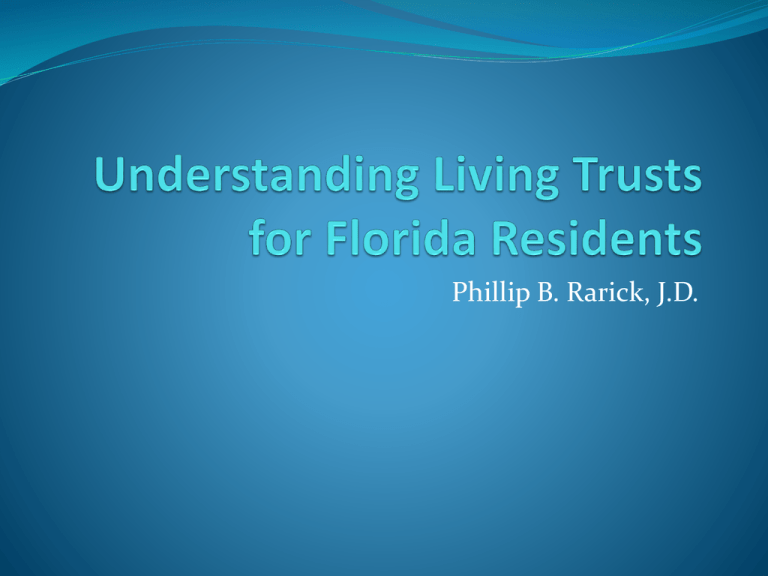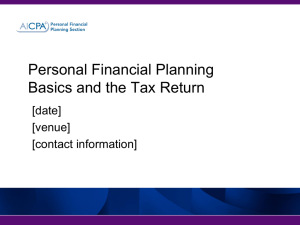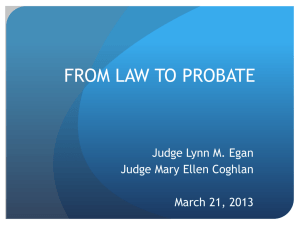Understanding Living Trusts
advertisement

Phillip B. Rarick, J.D. Introduction Why Living Trusts? – People want to avoid probate in the event of disability or death. Estate planning is not just for the wealthy. We’ll show you how to keep legal control in the family and stay out of the court. 5 Basic Ways People “Plan” Their Estates 1. Losing Control With a Will 2. Losing Control By Doing Nothing 3. Losing Control With Joint Ownership 4. Losing Control By Giving Away Assets 5. Keeping Control With a Revocable Living Trust 1. Losing Control With a Will A will does not avoid probate when you die. All wills must be admitted to the probate court. A will does not avoid guardianship – the legal process where the court steps into your life if you become mentally incapacitated and appoints a guardian to manage your personal and/or financial affairs. What is probate? Why do we go through it? Probate is the legal process where the court makes sure that: your will is legally valid, Your debts are paid, and Your assets are distributed according to your will & Florida law. It is bureaucratic, costly, and time consuming. What assets go through probate? Not everything you own is automatically subject to probate. Jointly owned assets that transfer to the surviving owner and assets that have a valid beneficiary designation (like an insurance policy) generally do not go through probate. What’s bad about probate? It can be expensive Attorney fees are usually 3% or more of the estate’s gross value. Personal Representative fee, if not waived, can be up to 3% of the total probate estate. It takes time – usually 9 months to 2 years During this time, the assets will likely be frozen. Loss of privacy Probate is a public process – “interested parties” can find out who the heirs are, what they will receive, and their addresses. Loss of control & intervention of the court in your family affairs The probate judge has supervision over how your Will is interpreted, how much probate will cost, how long it will take, and what information is made public. Wills cannot plan for disability If you can’t handle your affairs because of mental or physical incapacity, and you have not legally given another person the legal authority to sign for you, you can not transfer assets without the intervention of the probate court. 2. Losing Control By Doing Nothing If you own assets in your name & become incapacitated, the court can take control. When you die, your estate will go through probate & your assets will be distributed according to Florida law. Under Florida law, if you are married & have children, they will receive a share of your estate. If you have minor children, the court will control their inheritances & appoint guardians. 3. Losing Control With Joint Ownership “JTWROS” – means Joint Tenancy with Right of Survivorship. Upon the death of one person holding as JTWROS, the survivor takes everything. Problems JTWROS can cause: It could defeat the objectives of your will. Putting a savings account in joint name with a son/daughter will expose that money to the creditors of that child. For married couples with a taxable estate over $10.5 million, jointly held property can have adverse estate tax consequences. 4. Losing Control By Giving Away Assets The primary problem with giving away an asset is – it’s gone. What if you want or need it back? What if the son/daughter becomes mired in a divorce? What if the child is in an auto accident and is sued? Another problem is the gift tax. If the value of the asset you give away exceeds $14,000 per person annually, a gift tax return should be filed. 5. Keeping Control With a Revocable Living Trust What is a Revocable Living Trust? Revocable mean you have unfettered discretion to alter, change, amend, or revoke the trust. It is a legal document that includes your instructions for what you want to happen to your assets when you die. It avoids probate at death. It prevents the court from controlling your assets if you become incapacitated. How does a Living Trust avoid probate & prevent court supervision at incapacity? When you set up a Living Trust, you transfer assets from your individual name to the name of your Trust, which you control. Technically, you no longer own anything, so there is nothing for the courts to administer when you die or if you become incapacitated. This is what keeps you & your family out of the courts. Do I lose Control of the assets I put into my Living Trust? No, you keep full control. You can still buy, sell, and invest. You can make changed or even cancel your Trust. Nothing changes but the names on the titles. How does a Living Trust work? When you set up a Living Trust, you become the Trustmaker, Trustee, and Beneficiary. If you are married, you & your spouse can be Co- Trustmakers, or you can be Trustmakers of your own separate Trusts. Only you, the Trustmaker, can make changes to your Trust. What happens if I become incapacitated? If you have named someone else as your Trustee or to be a Co-Trustee with you, they will continue to manage your financial affairs according to your Trust’s instructions for as long as necessary. If you are the only Trustee or your Co-Trustee is unable to act, your hand-picked Successor Trustee(s) will step in and act for you. What happens when I die? Your Trustee or Co-Trustee essentially has the same duties as a Personal Representative. He/she collects any income or benefits, pays your remaining debts, sees that tax returns are filed, and distributes assets according to your Trust’s instructions. Who can be a Successor Trustee? Successor Trustees can be individuals (your adult children, other relatives, or a trusted friend) and/or a Corporate Trustee, such as a bank or trust company. If you choose an individual, you should name more than one in case your first choice is unavailable or unable to act. You can name 2 or more to act together. How do I know my Successor Trustee will do what I want? Trustee are fiduciaries. Under Florida law, they have a legal duty to follow your Trust’s instructions & act in a “prudent” (conservative) manner. If you Successor Trustee were to abuse his/her duties, he/she could be held legally liable. Does a Living Trust reduce my taxes? A Revocable Living Trust has no effect on your income taxes. Depending on the size of your estate, a Living Trust can help reduce or even eliminate estate taxes when you die. What is the Current Estate Tax or “Death Tax”? For U.S. citizens: Estate tax exemption for 2013 is $5.25 million. Estates above $5.25 million are taxed at the rate of 40%. For non-residents: Estate tax exemption for 2013 is $60,000. Estate above $60,000 are taxed at the rate of 40%. Important Planning Notes Estate tax law is fluid & difficult to predict. This makes it essential that you establish & maintain a relationship with an estate planning attorney who will keep you advised of the latest changes in the law. To Determine You Net Estate Add up the present value of your assets and subtract your debts. Your assets are everything you own: home, other real estate, investments, personal belongings, retirement benefits, IRAs, death benefits, & life insurance. Is there anything I can do about estate taxes? Yes – if you plan NOW. If you are married, and you and your spouse are U.S. citizens, use the marital deduction. When you die, you can leave an unlimited amount to your spouse tax-free. When your spouse dies, the estate will be entitled to your exemption along with your spouse’s exemption ($10.5 million in 2013). You can make gifts up to $14,000 ($28,000 if married) per year without gift tax implications. This will remove that amount from the estate permanently. What’s involved in setting up a Living Trust? You make the basic planning decisions by deciding who will be your Trustee, Successor Trustees, and Beneficiaries. The legal document is prepared from your decisions. After you’ve approved & signed the document, you transfer your assets to your Living Trust. This is called “funding” your trust. Do I need to fund my Living Trust now? If you want the control we’ve been talking about, you must fund your Living Trust now. Your Living Trust can only control the assets that have been transferred into it. Is it hard to put assets into my Living Trust? No – your attorney, financial advisor, & insurance agent can help. You will need to change titles on real estate and other assets with formal titles, such as savings accounts, stocks, CDs, other investments, insurance, safe deposit boxes, etc. Tax deferred savings plans, like IRAs and 401(k) plans are exceptions. If you are married, there may be valid tax reasons for you to name your spouse as first Beneficiary and your Trust as second Beneficiary. Doesn’t it take a lot of time to change titles & beneficiary designations? It will take some time. But you can do it now, or you can pay the courts & attorneys to do it for you later when you can’t. One of the benefits of a Living Trust is that it organizes all you assets under one plan, with one master set of instructions. Should I have an attorney prepare my Living Trust? Yes, preferably an experience attorney who specializes in Living Trusts. “Do-it-yourself” trusts generally don’t meet Florida law requirements or fulfill the family’s needs. These attempts to save money result in expensive fix- ups, expensive litigation, family headaches, and family division. Is a Living Trust expensive? Not compared to the costs & loss of control that come with probate at death & court supervision at incapacity. How much does a Living Trust Cost? The cost depends on how complicated your estate is & whether you need to do tax planning. I can tell you the exact cost following our initial meeting. How long does it take to get a Living Trust? It will only take 2 – 3 weeks to prepare the documents after you make the basic decisions. Are Living Trusts new? No, not at all. Trusts are as old as Wills. They have been used effectively for hundreds of years. When should I set up a Living Trust? Now, while you are healthy & you don’t think you need one. With estate planning, you don’t get a second chance to keep control in your family, and out of the courts. Consultation: Call Rarick, Beskin & Garcia Vega, P.A. at (305)556-5209 Estate Planning Checklist Answer each question YES or NO Has it been more than 3 years since you reviewed your estate plan, including your Will, life insurance policies, and any other documents? 2. If you or your spouse passed away today, are you uncertain about what would happen to your property? 3. If you became incapacitated, would your family have to go through court proceedings to carry on your affairs? 4. Do you have minor children or other people who are dependent on you? 5. If a death occurred & court approval was required to release accounts for working capital, could it disrupt your business or family life? 1. Estate Planning Checklist Cont. 6. Would you like to avoid probate of your estate? 7. Does the total value of you & your spouse’s assets (including life insurance, pensions, real estate, and any other assets) exceed $5.25 million (or $10.5 million for married couples)? 8. Does your life insurance or other accounts name a minor child as a beneficiary? 9. Do you have children by a previous marriage? 10. Have there been any major changes in your family since you last signed your will, such as marriage, separation, divorce, birth, etc.? If you answered YES to any one of the above questions, you may need estate planning now. YES answers indicate potential problems in the areas of tax, cost & delay of probate, or simply lack of a plan. Planning now can help solve these problems later!











